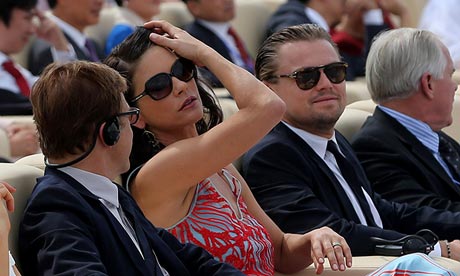China's richest man starts to build world's most costly film studio
Wang Jianlin, a property tycoon who also owns the world's largest cinema operator, plans £3bn complex with 20 stages

The Hollywood stars Christoph Waltz, Catherine Zeta Jones and Leonardo DiCaprio at the Qingdao Oriental Movie Metropolis launch. Photograph: ChinaFotoPress/Getty
It's a uniquely Chinese equation: take a government that's increasingly obsessed with its image abroad, add a wildly ambitious property tycoon, and you get a business announcement so elaborate that Leonardo DiCaprio will fly halfway across the world to bear witness to it.
China's richest man, Wang Jianlin, broke ground on Sunday for what is being touted as the world's most expensive film studio in Qingdao, a quiet city of three million people on the country's east coast.
When the Qingdao Oriental Movie Metropolis opens in 2017, according to Wang's speech at the ceremony, it will cover more than 500 hectares (two square miles) and include a studio for filming underwater, a permanent car show, seven resort hotels, an indoor amusement park, a 300-berth yacht club, 20 sound stages and a hospital.
DiCaprio, John Travolta, Nicole Kidman, Catherine Zeta Jones, Jet Li andEwan McGregor were all at the launch, alongside a host of other celebrities.
Wang, 58, the chairman of the Beijing-based property developer Dalian Wanda Group, called the studio the most expensive film industryinvestment of all time – an "unprecedented project that will create history" according to transcripts of his speech posted to the company's website. It will cost up to 30bn yuan (£3bn) and open in 2017.
The complex's sheer size is in keeping with the challenges that it seeks to overcome. China's film industry, while growing, is burdened by a stultifying bureaucracy and draconian censorship.
Hollywood imports account for the bulk of the country's box-office takings. While US-China co-productions have become common in recent years, few have gone on to conquer global markets. Many get so tangled up in negotiations that they never make it past the planning stage.
China maintains a strict quota on the number of foreign films screened in the country each year, and those that make the cut are often dragged down by censorship. The government-approved cut of the Wachowskis' Cloud Atlas was 40 minutes shorter than the original. In April, Quentin Tarantino's revenge western Django Unchained was withdrawn from cinemas minutes into its first screening; it reopened a month later with three of the goriest minutes missing and flopped.
The Chinese government has pumped billions of pounds of subsidies into the arts, hoping that domestic films can help improve the country's image abroad. China's film industry has grown tenfold since 2002, with an average of nine new screens opening in the country every day.
Wang is suffused with optimism: he told reporters that he expected China's cinema audience, currently the world's second largest, to take the top spot from the US by 2018. "With the huge potential that comes with a population of 1.3 billion, the global film industry will recognise that the sooner you partner with China, the sooner you make more money," he said, according to the state news agency, Xinhua.
Yet critics say that no matter how much cash is in the system, China will not outshine Hollywood until its film-makers are given more creative space.
Feng Xiaogang, a historical epic director sometimes called China's Spielberg, broached the topic while accepting a "director of the year" award from the China Film Directors' Guild in April. "A lot of times when you receive a [censorship] order, it's so ridiculous that you don't know whether to laugh or cry," he said. A video of his acceptance speech briefly went viral online before it was itself removed by censors.
Wang grew up hungry during Mao's Cultural Revolution and spent 17 years in the People's Liberation Army; he later became the first Chinese citizen to own a private jet.
His company is best known for its prime properties throughout China, including 72 Wanda Plazas – sprawling developments that usually include shopping centres, hotels and cinemas.
The company has also been exploring abroad. Last year, Wang's £1.6bn acquisition of the US multiplex chain AMC Cinemas made international headlines. He is building luxury hotels in New York and London. Last week, he donated £12m to the Academy of Motion Pictures and Sciences in Los Angeles, which will name a new film library in his honour.
No comments:
Post a Comment
Comments always welcome!